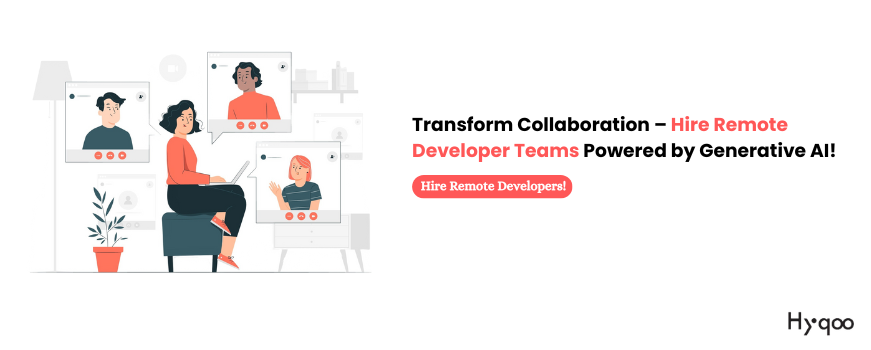11 Mins
11 Mins
Thanks to Generative AI, software developers can now concentrate on more complex problem-solving skills and creative aspects of their projects. Gen AI tools are efficient in generating content, whether it is an email from a marketing campaign or a code for a feature in the application.
This ability can be attributed to the transformer architecture, specifically the attention mechanisms, which allow the AI model to focus on different parts of the input strings. Understanding the context and dependencies is essential to generating coherent content over long stretches.
Gen AI is revolutionizing software development by automating many repetitive coding tasks. In addition to coding tasks, generative AI tools automate the repetitious and laborious tasks that engineers used to perform manually. As a result, engineers can now code more rapidly and accurately.
A recent study also found that up to 70% of software engineers report reducing debugging time by nearly 50% when using generative AI tools. 92% of developers in the United States are already loving and using AI coding tools both at work and outside of work. With the help of an LLM assistant, the time invested in manual processes can be reduced, and attention could be given to more important tasks, like understanding customer preferences to introduce an upgrade in the application and works.
A subset of AI technologies known as “generative AI tools” are made to produce new content by using patterns discovered in preexisting data, like text, images, or code. These tools use methods such as deep learning to comprehend and replicate the underlying structures of the data they are trained on. According to Gartner, by 2025, generative AI will be responsible for creating 10% of all data produced globally. It is indeed a mighty shift from less than 1% today.
Generative AI tools are used in software development as LLM assistants for tasks like fixing bugs, refactoring, code autocompletion, and even creating new code snippets. Gen AI is likely to remain at the center of innovation for several years.
As we continue to blur the distinction between man and machine, this technology has exciting implications for businesses and individuals. To get an improved output from Gen AI, it is essential to hire prompt engineers or gain expertise in prompt engineering to enter accurate and concise prompts to get the desired output from LLM within the initial attempt.
Generative AI has provided new opportunities for increasing productivity, communication, and collaboration. As a team leader, it will help you create a more efficient and cohesive remote work environment and simply remote team management.
Successful collaboration needs effective communication. Natural language processing-enhanced generative AI tools are revolutionary for facilitating communication between separate teams. These tools can interpret text-based instructions with up to 85% accuracy plus they can easily streamline project updates and requirement clarifications. GenAI tools help developers articulate ideas, requirements, and concerns clearly. These tools can even eliminate inaccurate data that may arise from insufficient written or face-to-face communication.
GenAI tools for code generation speed up the code-writing process, which has a major impact on the software development life cycle. Tools like GitHub Copilot have been shown to reduce code-writing time by up to 40% for routine tasks. They do their magic and free developers for higher-level tasks. This is accomplished using machine learning algorithms that examine patterns in existing codebases, propose solutions, and sometimes generate reference code snippets. This speeds up development and improves code quality.
GenAI tools support both coding and the development of collaborative environments. Regardless of geographic limitations, they offer developers virtual collaboration spaces where they may discuss ideas and work through problems together. As of 2024, over 67% of software teams use some form of AI-powered collaboration tool, which cites a 25% increase in remote productivity.
Documentation is an important aspect of software development, and GenAI tools can help automate this process. AI-powered documentation tools can create draft documents with up to 90% accuracy in technical language, which literally reduces the need for manual edits.
It can be difficult to find and fix bugs when working remotely. However, with AI tools that include built-in debugging capabilities, developers can identify potential problems early in the development process. A survey conducted by Stack Overflow reveals that 65% of developers feel that AI debugging tools have reduced bug resolution time by nearly half.
Generative AI tools may adjust to the preferences of a development team by providing customizable workflows that meet the team’s specific needs. These adaptive tools offer modularity that can cater to 85% of unique workflow requirements. It further ensures smooth integration into existing processes. This adaptability also guarantees that AI tools can seamlessly integrate with existing processes without disrupting the current workflow.
Working across time zones presents challenges that can be easily overcome with the help of generative AI tools. These tools can automate tasks and facilitate asynchronous communication because they are available around the clock, preventing disruptions to the workflow.
Embracing Generative AI in remote work environments necessitates developing responsible AI principles. It effortlessly improves data security and privacy by providing employees with AI literacy. It helps design AI to collaborate with humans and encourages continuous development to improve.
Here’s a brief roadmap to help you navigate a successful implementation before you hire remote software developers:
Identify the specific areas where Generative AI can provide the most value. In software engineering, common use cases include code generation, project documentation automation, and testing assistance.
Examine the various generative AI models and tools available, carefully weighing their potential against your objectives. Evaluate models like OpenAI’s Codex for code generation or Google’s BERT for NLP-focused applications. Consider ease of use, smooth platform integration, strong security, and responsible data privacy.
Create a controlled environment for learning and improvement by assigning your AI model to particular tasks or teams of individuals. Pilot studies suggest that an initial trial with a limited team can reveal up to 60% of integration issues. Before launching the system, get insightful feedback from these early adopters and use it to improve it.
Ensure that your employees are prepared to interact effectively with Generative AI. A recent McKinsey report highlights that organizations that invest heavily in AI training notice up to a 30% increase in productivity among tech teams. Provide specific training on how to use and collaborate with these tools. Focus on the human-AI relationship and the opportunities for growth to address concerns about job displacement directly.
To guarantee adoption, prioritize the smooth integration of generative AI tools with your business’s project management, communication, and collaboration platforms. Research from Accenture shows that integrating AI tools with existing workflows can reduce implementation friction by 45%, facilitating quicker adoption. This reduces disruption and increases user acceptance.
Data security and privacy cannot be compromised. According to a survey, 78% of businesses consider data privacy a top priority when implementing AI tools. Clearly define data access and usage guidelines to promote trust and stop sensitive data from being misused. Adopt robust encryption methods, such as AES-256, to ensure that data remains secure throughout the AI application lifecycle. To ensure the safety and security of your implementation, you must implement strong data security measures for efficient management.
Monitor key metrics and user feedback, and be ready to adjust and fine-tune the system based on data and insights. IBM’s AI Adoption Index indicates that iterative approaches in AI projects improve long-term success rates by nearly 20%. Remember that iterative approaches are essential for long-term success.
Create open communication with the staff about Generative AI and address concerns and questions transparently. A survey by Deloitte found that 64% of employees felt more comfortable using AI tools when there was clear communication from leadership. Building trust and acceptance of the new technology ensures that everyone feels secure and ready for the journey ahead.
Artificial intelligence is constantly evolving. By 2026, generative AI technology is projected to improve by over 50% in terms of speed and accuracy, driven by advancements in machine learning and data processing. Stay current on the latest advancements and look for new ways to improve its capabilities and use cases within your organization. Ongoing education and training will guarantee that your generative AI strategy stays on track and discovers its maximum potential.
Generative AI tools are transforming the remote collaboration landscape for remote software developers. These tools provide numerous benefits, ranging from improved communication to faster development processes, all of which contribute to a more smooth and efficient collaborative experience.
As technology advances, leveraging the potential of generative AI tools may be the key to enabling developer teams operating remotely to reach new levels of creativity and efficiency.
Hyqoo has a thorough understanding of the challenges that businesses face when entering this space. That’s why we use cutting-edge AI technology and smart talent to transform the remote work landscape. Hyqoo’s AI-optimized Talent Cloud can screen candidates up to 30% faster than traditional methods. It further helps companies to access expert GenAI talent in record time.
We make use of our wide network of pre-vetted professionals to help you hire generative AI engineers with experience and hands-on knowledge. Allow Hyqoo to leverage GenAI’s potential for your business by initiating remote hiring of Gen AI experts in software development. Contact us today to discuss your specific requirements.
1. What is an example of a Generative AI tool?
GenAI tools have a wide range of applications, including text and image generation as well as content creation. Examples include OpenAI’s GPT-4, which can generate human-like text and DeepMind’s AlphaCode. They are designed specifically for coding tasks with ultimate precision .
2. How does generative AI impact developer productivity?
By suggesting code completions, automating repetitive coding tasks, and spotting possible bugs early on, generative AI greatly increases developer productivity. Developers using AI-powered coding assistants can complete tasks up to 50% faster on average, as reported by MIT researchers. AI-powered tools can also help with documentation, test case generation, and code performance optimization.
3. Will generative AI replace software engineers?
While generative AI is capable of handling many aspects of software development, it is unlikely to replace software developers completely. It will function as an augmentation tool instead, enabling developers to collaborate more productively and creatively. According to PwC, by 2035, only 8% of software development jobs will be fully automated by AI, with the remaining roles requiring human oversight and expertise.
Share Article
Subscribe and get fresh content delivered right to your inbox

4 Mins
Autonomous AI agents are transforming how enterprises execute complex, multi-step workflows, from DevOps to customer support. This blog explores how Agentic AI, self-learning agents, and framework-native LLMs work together to handle reasoning, task planning, and dynamic tool use with minimal human input. Learn how these systems reduce errors, adapt in real time, and accelerate time-to-value. We also highlight why hiring AI prompt engineers and integrating the right AI talent is critical for scaling AI in business effectively.
Continue Reading

5 Mins
Framework-native LLMs are redefining how AI integrates into modern software systems. This blog explores how dev teams can build self-learning agents using tools like LangChain and LlamaIndex, fine-tune models with minimal friction, and seamlessly embed AI into existing frameworks. From Agentic AI to feedback loops, discover why this shift matters now and how to prepare your team for the next phase of enterprise AI adoption.
Continue Reading

10 Mins
Agentic AI is no longer a future concept; it’s here now and changing how businesses work. From autonomous decision making to multi-agent collaboration, businesses are deploying AI systems that think, act, and learn for themselves. This blog explains what Agentic AI really means, how it’s being used today, and why your business needs to be ready. Find out the key components, real-world use cases, and the strategic steps leaders need to take to stay ahead in the fast-moving AI landscape.
Continue Reading
Subscribe and get fresh content delivered right to your inbox
Prompt Engineer
AI Product Manager
Generative AI Engineer
AI Integration Specialist
Data Privacy Consultant
AI Security Specialist
AI Auditor
Machine Managers
AI Ethicist
Generative AI Safety Engineer
Generative AI Architect
Data Annotator
AI QA Specialists
Data Architect
Data Engineer
Data Modeler
Data Visualization Analyst
Data QA
Data Analyst
Data Scientist
Data Governance
Database Operations
Front-End Engineer
Backend Engineer
Full Stack Engineer
QA Engineer
DevOps Engineer
Mobile App Developer
Software Architect
Project Manager
Scrum Master
Cloud Platform Architect
Cloud Platform Engineer
Cloud Software Engineer
Cloud Data Engineer
System Administrator
Cloud DevOps Engineer
Site Reliability Engineer
Product Manager
Business Analyst
Technical Product Manager
UI UX Designer
UI UX Developer
Application Security Engineer
Security Engineer
Network Security Engineer
Information Security Analyst
IT Security Specialist
Cybersecurity Analyst
Security System Administrator
Penetration Tester
IT Control Specialist